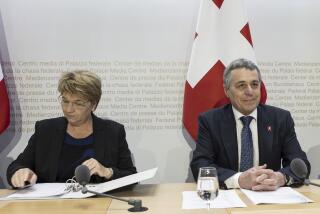ASIA : Southeast Nations Finally Get Security Watchdog: ARF : The new forum faces several crises when it convenes July 25.
- Share via
BANGKOK, Thailand — Europe has the Conference on Security and Cooperation. The Western Hemisphere has the Organization of American States. But as the recent nuclear crisis in North Korea demonstrated, when security problems boil over in Asia, there is no regional forum where countries can seek a peaceful solution.
Since the 1980s, a number of Southeast Asian nations have been pressing the big powers to join them in a semi-permanent conference to discuss security matters. But the Americans always balked, in part because of concerns about allowing the former Soviet Union to legitimize its nuclear Pacific presence.
But with the Cold War’s end, Southeast Asian countries led by Thailand revived the idea, and after two years of intense lobbying, the goal of a multi-power Asian security conference will finally be achieved with the convening of the ASEAN Regional Forum here July 25.
The conference will bring together six members of the Assn. of Southeast Asian Nations--Thailand, Malaysia, Singapore, Indonesia, Brunei and the Philippines--with foreign ministers of the United States, Russia, China, Japan, South Korea, Canada, Vietnam, Laos, Australia, Papua New Guinea and New Zealand.
An Australian diplomat wisecracked that the discussions leading to the founding of the forum, known by the unfortunate acronym of ARF, were started in the Year of the Dog, but otherwise the preparations are proceeding in deadly earnest.
The region has no shortage of simmering crises: China and Vietnam have been close to armed conflict over oil concessions in the South China Sea, and the conference’s host, Thailand, has been accused of trying to bring down the freely elected government in neighboring Cambodia by supporting the notorious Khmer Rouge insurgents.
But diplomats say it is unlikely that such contentious issues will get a detailed hearing at the first forum, out of concern there will never be a second. The real news, they say, is that the talks are happening at all.
Thai diplomats, who have been in the forefront of efforts to get the forum moving, are fond of referring to the meeting as “preventive diplomacy,” as opposed to crisis intervention.
Don Pramudwinai, director general of the Thai Foreign Ministry’s East Asian department, said there are no specific issues on the agenda. “Participants will probably touch on various principles they adhere or accede to that can be set out as guidelines for developing future relations,” he told a news conference Tuesday.
The talks this year will focus more on “confidence-building measures,” such as getting countries in the region to declare their defense policies, make public their armaments and allow regional military attaches to observe army exercises.
While this may seem modest, countries in the region have watched with mounting concern as China has been acquiring a huge arsenal of modern weapons capable of projecting military power great distances without declaring what the arms buildup is for.
“Everyone wants China to get used to coming to the negotiating table while it is preoccupied at home with economic development,” a diplomat said. “They want to housebreak the Chinese while they are still housebreak-able.”
The countries are also expected to deal with less contentious issues touching on “transnational security,” including drug smuggling, political refugees and illegal aliens. Bangkok, for example, has become a shipment point for illegal emigrants from China heading to the United States.
These talks will come on the heels of next week’s ASEAN ministerial meeting where two other regional breakthroughs are expected.
Vietnam, shunned by ASEAN countries because of its Communist government, is expected to be formally invited to join the organization. Full membership is expected to be granted in about 18 months.
And despite arm-twisting by the United States, the government of Myanmar, formerly Burma, will be represented at ASEAN talks for the first time, as the guest of Thailand. ASEAN countries rejected participation in a U.S.-led boycott of Myanmar--over rampant human rights violations--opting instead for “constructive engagement,” which does not involve interfering in neighbors’ affairs.
More to Read
Sign up for Essential California
The most important California stories and recommendations in your inbox every morning.
You may occasionally receive promotional content from the Los Angeles Times.













